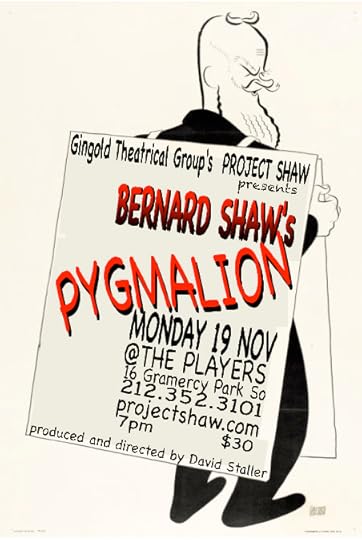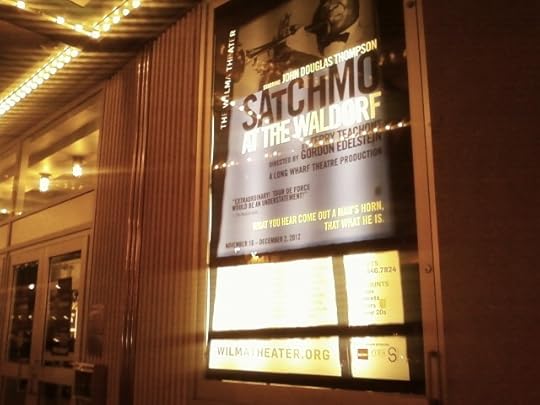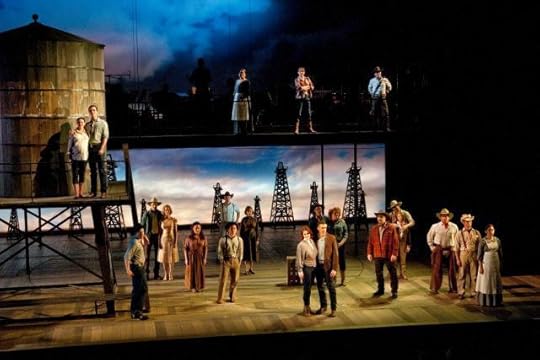Terry Teachout's Blog, page 119
November 18, 2012
TT: Read all about it
It takes a brave theater critic to write a play, and a brave critic to review it--especially since Satchmo at the Waldorf is by Terry Teachout, the esteemed critic of the Wall Street Journal. So it's both a pleasure and a relief to tell you it's a great show....
Read the whole thing here .
TT: Guest shot
 Project Shaw, the estimable New York outfit that presents monthly Monday-night concert readings of the plays of George Bernard Shaw, has now gotten around to Pygmalion, the famous 1912 play on which My Fair Lady is based. The production is directed by David Staller, who knows more about Shaw than
just about anybody
. The performance will be narrated by Michael Musto, and I'm the guest host, in which capacity I'll be saying a few concise introductory words about Shaw and the play.
Project Shaw, the estimable New York outfit that presents monthly Monday-night concert readings of the plays of George Bernard Shaw, has now gotten around to Pygmalion, the famous 1912 play on which My Fair Lady is based. The production is directed by David Staller, who knows more about Shaw than
just about anybody
. The performance will be narrated by Michael Musto, and I'm the guest host, in which capacity I'll be saying a few concise introductory words about Shaw and the play.The performance will take place at the Players Club, 19 Gramercy Park South, at seven p.m. For tickets or more information, go here .
TT: Almanac
William Haggard, Venetian Blind
TT: Just because
(This is the latest in a series of arts-related videos that appear in this space each Monday and Wednesday.)
TT: This moment, this minute
 For me, on the other hand, the book is still open, and apparently remains full of surprises. Here's something that I
wrote
on my fiftieth birthday:
For me, on the other hand, the book is still open, and apparently remains full of surprises. Here's something that I
wrote
on my fiftieth birthday:Like many people, my life has been a series of goals, a things-to-do list, and at fifty I now find myself in the position, at once pleasing and disconcerting, of having accomplished most of them. As for the things I haven't yet done, nearly all of them are things I'm no longer likely to do, assuming I ever was: I doubt, for instance, that I'll learn a second language or write a novel or become a father. I could spend the rest of my life running in place, and I suppose that would be perfectly fine. Except that I know it wouldn't. The time will come, if it hasn't already, when I'll want to try my hand at something new--and I haven't the slightest idea what it might be.
Now I know: I wrote a play and two opera libretti, all of which have since been professionally produced. In 2006 I had no idea that a part-time career as a dramatist lay dead ahead of me. It wasn't something I'd ever imagined, much less sought, and no day passes on which I fail to be amazed by the fact that it happened. Presumably I'll get used to this strange new reality sooner or later, but not yet.
Being a writer, I feel instinctively that I ought to have something staggeringly pithy and wise to say about all this. Alas, I have nothing to offer but the usual fill-in-the-blank clichés, which are no more interesting for being true. You are, of course, at liberty to feel hopeful or inspired by my experience, but the older I get, the less sure I am that anybody's experience, least of all mine, is relevant to the rest of the world, or that life itself has some intelligible "meaning" that is capable of being communicated to others.
H.L. Mencken, who was the blackest of skeptics, offered this dire perspective on the meaning of life in a 1920 essay:
(1) The cosmos is a gigantic fly-wheel making 10,000 revolutions a minute.
(2) Man is a sick fly taking a dizzy ride on it.
(3) Religion is the theory that the wheel was designed and set spinning to give him the ride.
I think that Mencken, as he so often did, was coming it more than a little bit high. Justice Holmes, on the other hand, said something similar but truer around the same time in a letter to an old friend: "I was repining at the thought of my slow progress--how few new ideas I had or picked up--when it occurred to me to think of the total of life and how the greater part was wholly absorbed in living and continuing life--victuals--procreation--rest and eternal terror. And I bid myself accept the common lot; an adequate vitality would say daily, 'God, what a good sleep I've had,' 'My eye, that was dinner,' 'Now for a fine rattling walk'--in short, life as an end in itself." Those are wise words.
I became friends this past summer with a pair of installation artists, both of whom freely accept and embrace the ephemerality of their creations. I admire them for it, since this is something I find all but impossible to do. Most people who write books, after all, do so in the (usually) foolish hope that their work will outlast them. I regret to say that I'm no different, though at least I'm realistic about my prospects for posthumous survival, which I take to be nugatory.
 So why do I write, other than for money? The answer is surprisingly simple: I do it because making art is one of the best ways that I know to make the present moment an end in itself. "Why are you stingy with yourselves?" George Balanchine used to ask his dancers. "Why are you holding back? What are you saving for--for another time? There are no other times. There is only now. Right now."
So why do I write, other than for money? The answer is surprisingly simple: I do it because making art is one of the best ways that I know to make the present moment an end in itself. "Why are you stingy with yourselves?" George Balanchine used to ask his dancers. "Why are you holding back? What are you saving for--for another time? There are no other times. There is only now. Right now."I thought of those words on Saturday as I watched Satchmo at the Waldorf at Philadelphia's Wilma Theater . John Douglas Thompson had the opening-night crowd in the palm of his hand, and the applause at show's end was tumultuous. All of us--myself very much included--were completely present in the moment. Nothing else mattered, or even existed.
It happens that I included Mr. B's words, as well as the preceding quotation by Justice Holmes, in a 2005 posting on the occasion of the twentieth anniversary of the day that I moved to New York City. Here's what I said at the end of those fugitive reflections, which are not unlike these fugitive reflections: "Like the cops say, Rule No. 1 is to go home alive at the end of your shift. Every day is a victory over the abyss."
It is, I gather, a privilege of middle age to repeat oneself, and I hope it's not an abuse of the privilege to do so at a seven-year interval. So for those of you just joining us, allow me to sum up what I think the creation of Satchmo at the Waldorf, The Letter, and Danse Russe has taught me, which is that surprising things can happen to a person who marches into the nearest crossroads, takes a deep breath, and moves decisively in one direction or another. It may not even matter which path you choose. The only mistake you can make is to stand still. Yes, the possibilities of life are strictly and cruelly limited, but to move forward, to grasp the larger hope, is to defeat the abyss, if only for another day. There is only now.
* * *
Robert Johnson sings "Cross Road Blues":
November 15, 2012
TT: An Oklahoma! for our time
* * *
The Broadway musical has never been more popular, or less interesting. No other genre remains so essential to the American stage, yet no more than a half-dozen new musicals of indisputable quality have made it to Broadway since the turn of the twenty-first century, and the creative torpor that afflicts the genre continues to grow deeper. If you want to see a first-rate new musical nowadays, you've got to look to Off Broadway or regional theater. Michael John LaChiusa's "Giant," for instance, was premiered at Signature Theatre of Arlington, Va., three years ago and has now reached the Public Theater after an intermediate stop in Dallas. About time, too, for "Giant" is the most important new musical to come along since "The Light in the Piazza." It's a show of immense and fully realized promise--and it deserves to move uptown.
 "Giant" is based on Edna Ferber's sprawling 1952 saga of life and love on a Texas cattle ranch, which George Stevens later turned into a widescreen extravaganza starring James Dean, Rock Hudson and Elizabeth Taylor. Mr. LaChiusa and Sybille Pearson, who wrote the book of "Giant," have wisely chosen to return to the original source, in the process improving it decisively. Ms. Ferber, best remembered for the 1926 novel on which "Show Boat" is based, was a good storyteller but a stiff stylist, and Ms. Pearson's adaptation retains her page-turning plot while jettisoning virtually all of her leaden prose, leaving plenty of room for Mr. LaChiusa to do his stuff.
"Giant" is based on Edna Ferber's sprawling 1952 saga of life and love on a Texas cattle ranch, which George Stevens later turned into a widescreen extravaganza starring James Dean, Rock Hudson and Elizabeth Taylor. Mr. LaChiusa and Sybille Pearson, who wrote the book of "Giant," have wisely chosen to return to the original source, in the process improving it decisively. Ms. Ferber, best remembered for the 1926 novel on which "Show Boat" is based, was a good storyteller but a stiff stylist, and Ms. Pearson's adaptation retains her page-turning plot while jettisoning virtually all of her leaden prose, leaving plenty of room for Mr. LaChiusa to do his stuff.It's no slight to Ms. Pearson to say that her collaborator is the senior partner in "Giant." Mr. LaChiusa, after all, is one of the two most prodigiously gifted musical-theater songwriters to come along since Stephen Sondheim. Like Adam Guettel, who wrote the score for "The Light in the Piazza," he uses the language of popular music to serve expressive ends that are fundamentally operatic, exploding the simple chorus-based forms of traditional pop song and expanding them into large-scale structures similar to those used by Mr. Sondheim in "Passion" and "Sweeney Todd." Not only do his musical numbers drive "Giant" through its dramatic arc with compulsive force, but much of Ms. Pearson's dialogue is underscored, which prevents "Giant" from losing any momentum along the way. The result is a show that doesn't have any slow spots--one that feels not long, but big....
Time was when prim West End playgoers went in for bait-and-switch farces with titles like "No Sex Please, We're British" that took care to promise far more in the way of fornication than they ever delivered. While such plays have never had much luck on Broadway, that hasn't stopped David West Read from cooking up a homegrown counterpart of the same flyweight genre. Mr. Read's "The Performers" is a nominal comedy about a straightlaced couple (Daniel Breaker and Alicia Silverstone) who find themselves thrust among a gaggle of numbskulled porn stars (Jenni Barber, Ari Graynor, Cheyenne Jackson and Henry Winkler) who long for domestic tranquility in between cinematic couplings. I won't say that "The Performers" is the dumbest play ever to reach Broadway--the competition is stiff--but it may well be the first Broadway play in which five of the six characters are utterly, irredeemably brainless....
* * *
Read the whole thing here .
Excerpts from Signature Theatre's production of Giant:
TT: Almanac
Joseph Conrad, letter to Edward Garnett, Mar. 29, 1898 (courtesy of Jon Winokur)
TT: Not to belabor the point...
For more information, go here .
November 14, 2012
TT: So you want to see a show?
Here's my list of recommended Broadway, off-Broadway, and out-of-town shows, updated weekly. In all cases, I gave these shows favorable reviews (if sometimes qualifiedly so) in The Wall Street Journal when they opened. For more information, click on the title.
BROADWAY:
• Annie (musical, G, reviewed here)
• Bring It On (musical, G, closes Dec. 30, reviewed here)
• Evita (musical, PG-13, reviewed here)
• The Mystery of Edwin Drood (musical, PG-13, most performances sold out last week, reviewed here)
• Once (musical, G/PG-13, most performances sold out last week, reviewed here)
• Who's Afraid of Virginia Woolf? (drama, PG-13/R, reviewed here)
OFF BROADWAY:
• Avenue Q (musical, R, adult subject matter and one show-stopping scene of puppet-on-puppet sex, reviewed here)
• The Fantasticks (musical, G, suitable for children capable of enjoying a love story, reviewed here)
• Tribes (drama, PG-13, closes Jan. 6, reviewed here)
CLOSING NEXT WEEK OFF BROADWAY:
• The Freedom of the City (drama, PG-13, closes Nov. 25, reviewed here)
TT: Almanac
Loren Eiseley, All the Strange Hours: The Excavation of a Life
Terry Teachout's Blog
- Terry Teachout's profile
- 45 followers



